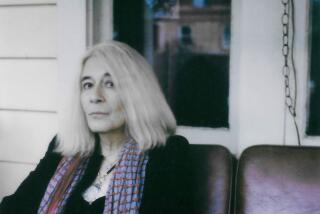Sicilian Teen’s 1st Book, ‘I Wanted Pants,’ Stirs Protests--and Big Sales--in Italy
- Share via
ROME — In small towns in Sicily, where just looking at a man can get a woman labeled “loose,” Lara Cardella is being called all kinds of names for telling how it is to grow up female and Sicilian.
The 19-year-old native of Licata, Sicily--population 45,000--is also selling a lot of books.
Her novel “Volevo I Pantaloni” --”I Wanted Pants”--has been Italy’s best-selling paperback since early spring. Cardella wrote it at night, longhand in a notebook, in her parents’ house, and submitted it in an Italian contest for young, unpublished writers.
She says she didn’t expect to win, let alone get published. She did both.
Arnoldo Mondadori, the Italian publishing giant, has already sold the film rights for the book, which at 121 large-type pages is more a novella than a novel.
Cardella also didn’t expect insulting telephone calls and scornful looks from townspeople who felt ridiculed by the book.
When she came out of her house one day with a French TV crew, paramilitary police had to protect her from a crowd shouting curses, she recalls.
“Some of my friends stayed by me. Some of them left me,” she said in a recent telephone interview from her home. “My sister was forced to change schools. Few of my parents’ friends remain.”
The small town in her scathing story could be Licata or hundreds of other coastal towns or mountain villages in Sicily.
Telling the story is 16-year-old Annetta. She is not an autobiographical character, Cardella says, but embraces the experiences of many of her girlfriends whose modest attempts at liberation--like kissing a boy in public--sometimes ended in beatings or being kept at home under even tighter supervision.
Annetta wants to wear pants like men. Or at least be able wear her skirts short, like her friend Angelina, who used to live in the more liberal north.
Annetta asks her mother how she can get pants.
“Her reply, innocent, revolutionized my adolescent life,” Annetta says. “She told me, ‘ I pantaluna falli purtari e masculi e buttani .’ ” The Sicilian dialect translates: “Men and whores wear pants.”
Annetta then sets out to learn how to put on lipstick, sway her hips so boys will notice her and lie to her parents so they’ll let her go to an afternoon party--at Angelina’s house, naturally--where there are more boys than girls and no parents.
At the party she meets a boy named Nicola. The next day an uncle sees Nicola kissing Annetta. She is beaten up by her father and renounced by her mother, who is so busy weeping from shame that she quits cooking dinner.
Wanting to eat again, her father arranges for Annetta to stay with an uncle, even though her parents know the uncle sexually molested her when she was 10 years old.
“Woman is wife, woman is mother, but she is not a person,” Cardella writes.
Most of Licata’s residents who protested the book didn’t read it, she says.
nd derided one of southern Italy’s most sacred rituals, the Sunday afternoon passeggiata , or stroll, taken after the day’s big meal.
Girls walk hand in hand, around and around the main square. Boys cluster in groups and ogle the girls, who have mastered the art of looking chaste and sexy at the same time. Older folks sit on the sidelines to make sure that all the boys and girls exchange are looks.
After the television show, Cardella told another interviewer that the mayor met her on the street and said: “You need to be straightened out.”
Cardella regrets blurting out on television that “99%” of Sicilians are backward.
“I love Sicily. It’s so beautiful, it’s stupendous. But the idea that people won’t denounce violence is wrong. . . . Violence exists. . . . I think it’s wrong a woman can’t go to a disco.”
In general, she says, girls are more repressed in the poorer towns and neighborhoods.
“People say I’m impulsive. That I want to change things too quickly. But I don’t want to wait 100 years. I don’t want to know my daughter will have the same problems I did.”
More to Read
Sign up for our Book Club newsletter
Get the latest news, events and more from the Los Angeles Times Book Club, and help us get L.A. reading and talking.
You may occasionally receive promotional content from the Los Angeles Times.









